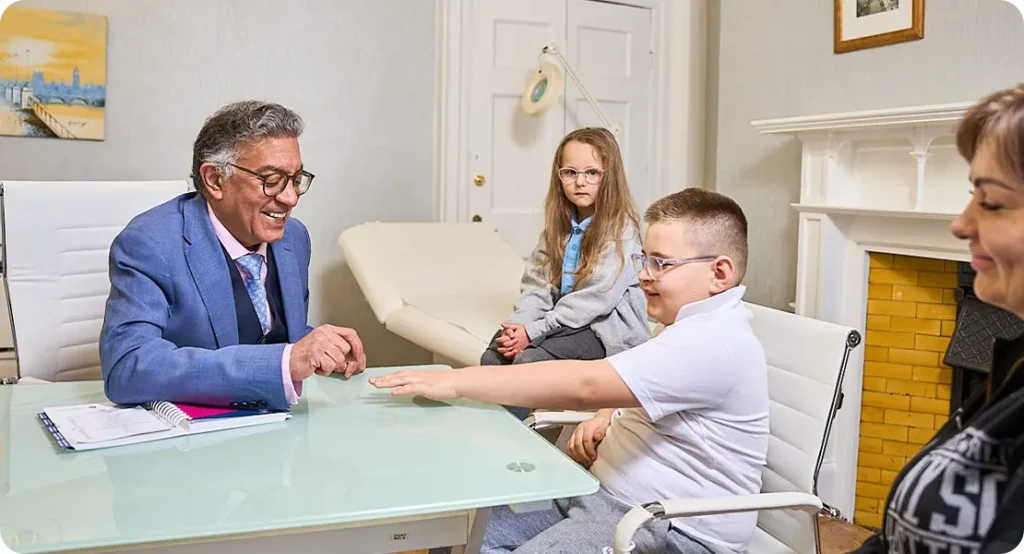London has long been a global destination for world-class medical care, attracting patients not only from across Europe but also from the Middle East, Africa, Asia, and North America. Thanks to its highly qualified specialists, advanced medical facilities, and commitment to patient-centred care, the city has earned a reputation as a trusted centre for health tourism.
Dermatology is no exception. From routine mole checks and advanced skin cancer screening to the management of chronic conditions like psoriasis, acne, rosacea, or eczema, London dermatology clinics offer a wide range of services that draw people from all corners of the globe. Many patients also travel for cosmetic treatments, such as laser therapy, chemical peels, or skin rejuvenation procedures, performed by experienced consultants using the latest technology.
If you’re considering travelling for dermatological care whether for a second opinion, a specialist procedure not available in your home country, or simply to receive treatment in a highly regulated healthcare system you’ll find that many private dermatology clinics in London are well-equipped to support international patients at every step of the journey. From remote pre-consultations to multilingual staff, assistance with medical records, insurance coordination, and arranging follow-up care, the process is often far more streamlined than you might expect.
In this guide, I’ll walk you through how dermatologists in London manage care across borders covering everything from virtual consultations and language support to insurance paperwork and coordinating post-treatment care so you can make informed decisions with confidence and peace of mind.
Why Patients Travel to London for Dermatology Care
When it comes to skin health, many patients around the world don’t hesitate to go the extra mile literally. London has become a leading destination for dermatology care, attracting individuals from Europe, the Middle East, Asia, and beyond.
Here’s why so many people choose to travel here for expert skin treatment:
Specialist Expertise
London’s dermatology clinics are staffed by world-renowned consultants who often have decades of hands-on experience treating complex and rare skin conditions. Many are leaders in their field, regularly contributing to research, publishing in medical journals, and teaching future dermatologists.
Private Access and Fast Appointments
One of the key draws is speed. In contrast to public healthcare systems where waiting lists can be long, private clinics in London offer fast-track appointments sometimes within just a few days.
Trusted Second Opinions
For those already diagnosed elsewhere, London clinics provide trusted second opinions. International patients frequently visit to confirm diagnoses, explore alternative treatment options, or simply gain peace of mind by hearing from top consultants.
Comprehensive, Integrated Services
Many private dermatology centres in London offer a wide range of services all under one roof. From dermatology and pathology to cosmetic procedures and minor surgery, everything is coordinated efficiently in one place.
English-Speaking Care with Global Support
English-speaking consultants make communication easier and more reassuring for international patients. Clinics also frequently offer multilingual support and interpreters, helping those from non-English-speaking countries feel comfortable, understood, and well-informed throughout their care.
1. Virtual Consultations Before You Travel

If you’re thinking about travelling to London for dermatology care, the journey often begins long before you step on a plane. Most clinics now offer virtual consultations, allowing international patients to connect with expert dermatologists from the comfort of their own homes.
- Secure Video or Phone Call
You’ll be scheduled for a confidential video or phone appointment, during which you can discuss your concerns in detail. Ahead of the call, you may be asked to send clear photographs of your skin, medical records, and information about any treatments you’ve previously tried. - Detailed Discussion
During the consultation, the dermatologist will carefully review your history, ask targeted questions, and assess your condition based on the information provided. They will explain possible diagnoses and discuss recommended next steps, including whether in-person treatment is advisable. - Written Treatment Plan
After your consultation, you’ll receive a written summary outlining the proposed treatment approach. This can be helpful to share with your local healthcare provider or to keep for reference as you consider your options. The summary may also include pricing estimates, timelines, or pre-travel preparation guidelines.
This remote-first approach helps you make an informed decision about whether travelling to London is the right move. It also gives you a clear understanding of what to expect upon arrival, reducing uncertainty and helping you plan with confidence.
2. Coordinating Care Across Borders
Once you’ve decided to travel to London for dermatology treatment, the next step is seamless coordination between your local healthcare providers and the clinic you’re visiting. Many private dermatology centres in London have experience supporting international patients and are well-equipped to manage care across countries.
Medical Records Transfer
To provide you with the best possible care, your chosen clinic can liaise directly with your home physician or dermatologist to request and review your medical records. This may include diagnostic reports, previous prescriptions, treatment history, and any biopsy or lab results.
Treatment Summaries for Return Home
After your in-person appointment or procedure, you’ll receive a comprehensive treatment summary. This document outlines what was done, what the diagnosis is (if confirmed), the medications prescribed, and the recommendations for future care.
Follow-Up Options
Many clinics offer remote follow-up appointments via video call, allowing your specialist to check on your healing progress, review test results, or adjust medication as needed without requiring another international trip.
With this level of coordination, patients can feel confident that their treatment will be both high quality and seamlessly integrated with their ongoing care at home.
3. Language Support
When seeking medical care abroad, clear and accurate communication is essential not just for understanding your diagnosis and treatment plan, but also for feeling confident and at ease throughout the process.
- Multilingual Staff
Many clinics employ receptionists, nurses, or administrative staff who are fluent in widely spoken languages such as Arabic, French, Spanish, Mandarin, or Russian. These team members help bridge the communication gap from the moment you first get in touch, whether by phone, email, or in person. - Professional Interpreters
For more in-depth discussions such as medical histories, complex diagnoses, or consent for procedures professional interpreters can be arranged in advance. These interpreters are trained in medical terminology and ensure that you and your dermatologist fully understand one another during every stage of the consultation and treatment process. - Translated Documents
To support your ongoing care and provide clarity, many clinics can offer translated versions of key documents, including treatment plans, consent forms, and invoices.
This focus on multilingual communication ensures that nothing gets lost in translation making your experience safer, smoother, and more reassuring.
4. Navigating Private Insurance and International Billing

Paying for medical treatment abroad can feel overwhelming, especially when navigating unfamiliar systems or currencies. Fortunately, many private dermatology clinics in London are experienced in working with international patients and strive to make the financial process as transparent and manageable as possible.
- Cost Estimates in Advance
Before you commit to travelling, most clinics are happy to provide detailed written cost estimates. These typically include consultation fees, diagnostic tests, procedures, and any follow-up appointments that may be required. - Direct Billing to Insurers
Many London clinics have established partnerships or direct billing arrangements with major international health insurers such as Bupa Global, Cigna, AXA, and Allianz. If your insurance policy covers private dermatology care abroad, the clinic may be able to bill the insurer directly saving you the hassle of paying upfront and managing reimbursement later. - Clear Receipts for Reimbursement
If you do need to pay out-of-pocket, rest assured that you’ll receive comprehensive invoices with all the necessary details for insurance claims. - Deposit Policies
To secure appointments, especially with high-demand consultants or for procedures requiring block scheduling, some clinics may request a deposit. This amount is usually deducted from your final bill.
Understanding these financial processes ahead of time helps reduce stress and ensures there are no surprises when it comes to settling your bill.
5. Common Conditions International Patients Seek Treatment For
London dermatology clinics welcome patients from all over the world, offering advanced care for both medical and cosmetic skin concerns. Many international visitors seek expert help for conditions that require specialist knowledge, advanced treatments, or second opinions. Here are some of the most common reasons patients travel to London for dermatological care:
- Skin Cancer Screening
Early detection is key when it comes to skin cancer. Clinics in London offer full-body mole mapping using high-resolution imaging, as well as dermoscopy to closely examine suspicious lesions. If needed, biopsies can be performed on-site, with results processed quickly for timely diagnosis. - Psoriasis and Eczema Management
Patients dealing with chronic inflammatory skin conditions such as psoriasis or eczema often travel to access cutting-edge treatments. London clinics offer advanced options, including biologic therapies, patch testing for allergens, and personalised skincare regimens tailored to each individual’s condition and lifestyle. - Acne and Rosacea
While acne and rosacea are common worldwide, not all countries have access to the full range of effective prescription medications. In London, patients can access tailored treatments that may include oral medications, topical therapies, and in-office procedures like chemical peels or light therapy, which are overseen by experienced consultants. - Hair Loss and Scalp Disorders
Concerns about thinning hair or patchy hair loss often bring patients to London, where specialists can diagnose conditions such as alopecia areata, androgenetic alopecia, or scalp psoriasis. - Cosmetic Dermatology
Many international visitors also seek aesthetic treatments while in London. These include mole and skin tag removal, anti-ageing procedures such as laser resurfacing and microneedling, pigmentation correction, and scar treatments. - Second Opinions for Complex Cases
London’s reputation for medical excellence draws patients who want a second opinion, particularly when they’ve been given a complex diagnosis or when previous treatments have failed.
By offering access to specialised diagnostics and world-class care, London clinics provide real solutions for patients who may not be able to find the help they need at home.
6. Planning Your Visit
Travelling to another country for medical care involves more than just booking an appointment it requires thoughtful preparation to ensure everything runs smoothly.
- Book in Advance
Dermatology consultants in London are often in high demand, especially those with subspecialty expertise. It’s a good idea to book your consultation several weeks ahead of your intended travel date. - Prepare Records and Photos
To give your consultant the most accurate picture of your condition, prepare a folder with your medical history, lab test results, previous biopsy reports, and details of any treatments you’ve tried. - Understand Entry Requirements
Depending on your nationality, you may need a visa to enter the UK. In some cases, especially for medical travel, visa applications may require proof of your appointment. - Check Covid Policies
While many pandemic restrictions have eased, some clinics still follow specific Covid-19 protocols. These might include mask requirements, pre-appointment health screenings, or testing policies especially for patients undergoing procedures.
By taking care of these logistical details in advance, you’ll be able to focus on what matters most receiving high-quality dermatological care and making the most of your time in London.
7. What Happens at Your Appointment

If you’re travelling to London for dermatology care, knowing what to expect during your visit can help you feel more confident and prepared. While every appointment is tailored to your individual needs, most follow a clear and structured process designed to ensure a thorough and efficient experience.
- Initial Consultation
Your appointment will typically begin with an in-depth discussion with the dermatologist. They’ll ask detailed questions about your symptoms, when they began, how they’ve progressed, and any treatments you’ve already tried. If you’ve sent records or photos ahead of time, these will be reviewed during this part of the consultation. You’ll also be asked about your overall health, medications, allergies, and any family history of skin conditions. - Examination
Depending on your concern, your dermatologist may perform either a targeted examination of the affected area or a full skin check. This could include examining moles, rashes, pigmentation, or signs of inflammation. For hair and scalp issues, a trichoscopic (magnified) exam may be performed. If needed, a chaperone will be available for your comfort during the exam. - Diagnostics
In many cases, your dermatologist may recommend further diagnostic tests to confirm a diagnosis. This might include a skin biopsy, blood tests to check for allergies or autoimmune markers, or imaging such as dermoscopy or mole mapping. These investigations are usually arranged on the same day or within a short timeframe at the same clinic or nearby partner facilities. - Treatment Plan
Before you leave, you’ll be given a personalised treatment plan. This may include prescriptions, skincare instructions, referrals for further testing, or recommendations for procedures. Everything will be explained clearly, and you’ll have an opportunity to ask questions. Many clinics also provide written summaries and can send digital copies to your email or to your referring doctor back home.
By the end of your appointment, you should have a clear understanding of your condition and the next steps whether that involves further treatment in London, at home, or a combination of both.
8. Post-Treatment Care and Follow-Up
Your dermatology journey doesn’t end when you leave the clinic ongoing support is a key part of the care many London clinics offer to international patients. Whether you’ve had a one-off consultation, a procedure, or started a new treatment plan, follow-up care ensures your recovery is smooth and your results are long-lasting.
- Remote Check-Ins
Many clinics offer virtual follow-up appointments via video call or phone. These check-ins give your consultant the opportunity to monitor your progress, assess how your skin is responding to treatment, and make any necessary adjustments to your medications or care plan. This is especially helpful if you’ve undergone a procedure or started a new prescription that requires close monitoring. - Emergency Contact Details
In case any complications or unexpected symptoms arise after you return home, most clinics provide direct contact details for urgent concerns. Whether it’s a reaction to medication, unexpected healing issues, or a new symptom, you’ll be able to get timely advice and know when it’s necessary to seek local medical support. - Letters for Your Local Doctor
To ensure seamless continuity of care, your clinic can provide a detailed letter summarising your diagnosis, the treatment you received, and the recommendations for follow-up. This documentation can be shared with your GP or local dermatologist so they can pick up where your London consultant left off, helping you avoid gaps in care. - Prescriptions and Medication Access
If you’ve been prescribed medication, your clinic will usually offer flexible options. In some cases, prescriptions can be arranged for collection at a local pharmacy before you leave London. Alternatively, many clinics can coordinate international shipment or provide the necessary paperwork for you to fill the prescription in your home country.
This comprehensive post-treatment support gives international patients the confidence to return home knowing they’re still in safe hands, with access to expert advice whenever it’s needed.
9. Tips for a Stress-Free Experience
Travelling for medical care can feel daunting, especially when navigating new systems and unfamiliar surroundings. But with a little preparation and organisation, your visit to a London dermatology clinic can be smooth, productive, and even enjoyable. Here are some practical tips to help ensure everything goes to plan:
Confirm Everything in Writing
Before you travel, ask for written confirmation of all key details your appointment time, consultant name, estimated costs, and any pre-visit instructions (such as fasting, skincare product restrictions, or stopping medications). This helps prevent misunderstandings and gives you a clear reference point if you need to make changes later.
Allow Time for Results
If your consultation involves tests such as biopsies or bloodwork, keep in mind that results may not be immediate. Pathology reports, for example, can take several days. It’s wise to factor in some flexibility in your travel schedule if you anticipate needing follow-up appointments based on those results.
Arrange Accommodation Nearby
If your treatment plan includes multiple visits such as an initial consultation followed by a procedure it’s worth booking accommodation close to the clinic. This not only saves travel time but also ensures convenience in case of early morning or follow-up appointments. Some clinics may even be able to recommend trusted local hotels used by other international patients.
Keep Contact Details Handy
Carry your clinic’s contact information with you, including phone numbers and email addresses for both the reception team and your consultant’s office. Should your plans change or you need to reschedule, having these details on hand ensures you can reach out quickly and avoid unnecessary stress.
With a few simple steps, you can minimise the logistical challenges and focus on what really matters getting expert dermatological care in one of the world’s leading medical hubs.
Final Thought: Making Dermatology Travel Stress-Free
Travelling for dermatology care doesn’t have to be complicated. With the right preparation and support, you can access world-class treatment, clear answers, and personalised care all in one visit. You can get in touch with us to book a consultation with one of our expert dermatologists in London if you’d like help planning your journey.
References:
- Hanefeld, J., Horsfall, D., Lunt, N. & Smith, R. (2013) Medical Tourism: A Cost or Benefit to the NHS? PLOS ONE, 8(10), e70406. doi:10.1371/journal.pone.0070406
- Lunt, N. et al. (2018) “Medical Tourists: Incoming and Outgoing,” The American Journal of Medicine, 131(6), pp. 694–696.
- National Health Service (2013) Qualitative Assessment of Visitor and Migrant Use of the NHS in England: Observations from the Front Line, GOV.UK.
- UK Government (2024) Visit the UK as a Standard Visitor: Visit for medical reasons, GOV.UK guidance.
- British Association of Dermatologists (2020) Dermatology: Handbook for Medical Students & Junior Doctors, 3rd edn.
